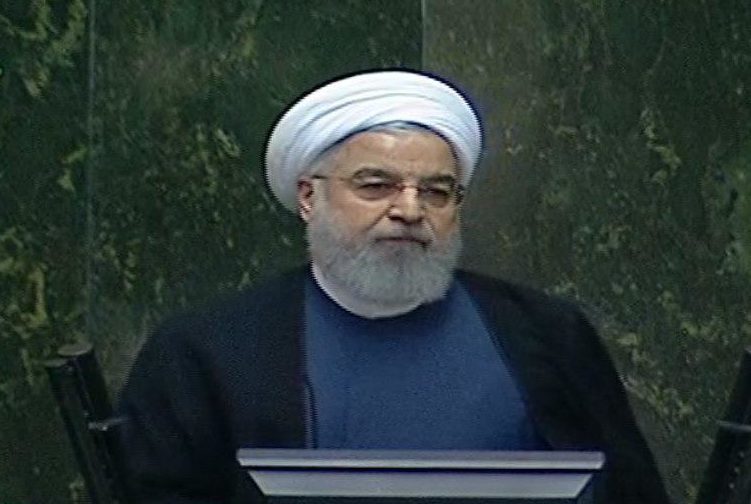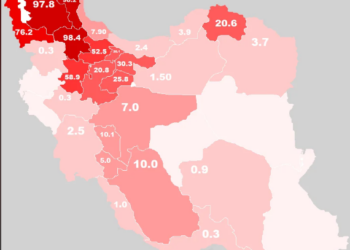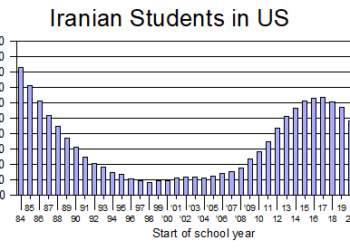September 21, 2018

President Rohani has been forced to appear before the Majlis to answer questions, only the second time in the history of the Islamic Republic that a president has been ordered to do so.
In a strong rebuke of his leadership, the Majlis voted to reject his answers to four of their five questions as unconvincing.
The Constitution allows the Majlis to summon a president to come before it. Mahmud Ahmadi-nejad was summoned in 2011, but no other president until now has faced such a political assault.
Even more stunning than the summons was the series of votes after Rohani spoke in which the deputies rejected most of what he said.
The only answer the deputies accepted was Rohani’s explanation of why the country’s banking sector remains under sanctions. The deputies barely accepted that explanation by a vote of 137 to 130 with three abstentions. Rohani said the problem was that the regime had not yet adopted all the reforms demanded by the Financial Action Task Force (FATF), so major international banks won’t deal with Iranian banks.
On his explanation of what the government is doing to fight smuggling, the deputies voted 123-138 with six abstentions to refuse to accept Rohani’s remarks. The president said he had halved the scale of smuggling, but that the final solution was for Iranian industry to produce higher quality products.
On Rohani’s response to a question on why the economy has done poorly during his time in office, the deputies rejected Rohani’s explanation 116-150 with eight abstentions.
On the issue of efforts to reduce unemployment, the deputies voted against Rohani 74-190 with eight abstentions. Rohani said his administration was doing a good job by creating 700,000 jobs a year.
Rohani did worst in his explanation for the collapse of the rial, where only 68 deputies accepted his explanation while 196 rejected it and eight abstained; more than two-thirds of the membership, 68 percent, voted against Rohani on the rial issue. Rohani blamed the rial’s collapse on President Trump’s withdrawal from the nuclear deal and the imposition of sanctions. But the collapse of the rial began in April, a full month before Trump dumped the nuclear agreement and four months before any sanctions were re-imposed. This vote showed that even the Majlis deputies are agreeing with the rioters in the streets who have been chanting that the damage to Iran comes mainly from inside Iran, not outside.
The following day’s newspapers saw the Reformist dailies, which normally fawn over Rohani, instead expressing discontent with what they saw as the president’s evasiveness and lack of transparency.
The one prominent figure to support Rohani was Supreme Leader Ali Khamenehi, who is commonly unhappy when the Majlis gets disruptive. Khamenehi bristles when the establishment’s reputation is brought into question. Khamenehi chose to ignore the Majlis questions and the president’s answers completely, and instead spoke up to describe the session of questioning the president as proof of the regime’s “authority and stability” and a sign of “religious democracy.”
Rohani himself did not take that position. Instead, he warned the deputies that airing the country’s problems publicly could be counter-productive. In very strong words, Rohani told the deputies, “Sabotage leads to destruction, and painting a bleak picture of people’s lives will lead to further darkness.”
Karim Sadjadpour, an analyst at the US-based Carnegie Endowment for International Peace, told The Washington Post Khamenehi undoubtedly loved the Majlis session. “He actually benefits from having a weakened Rohani remain in power [so Rohani can] absorb all the accountability for the lousy economy.”
The Majlis has the power under the Constitution to boot a president out of office, but Khamenehi has already ruled that out, saying such as action would “play into the hands of the enemy.”
Clement Therme, an Iran specialist at the International Institute for Strategic Studies (IISS) in London, told Agence France Presse, “No one believes Rohani will reform anything anymore. He was just a tool for the system, appearing to address people’s demands for change without really changing anything.”
Rohani’s problems reflect a basic contradiction in the Islamic Republic, Therme said: Elections are crucial to its legitimacy, but the Iranian people vote for reforms the system cannot deliver. “The Supreme Leader supports Rohani going to the end of his second term because he wants stability, but he thinks that if Rohani delivers on his policies, it will mean the end of the system,” Therme said.


















